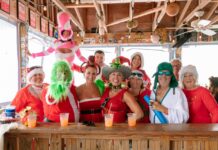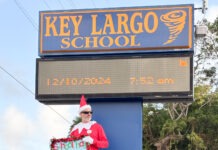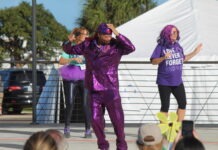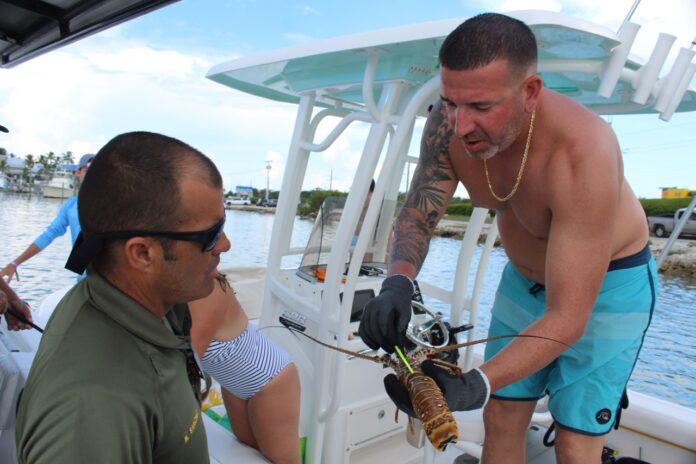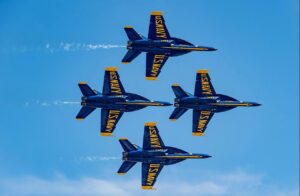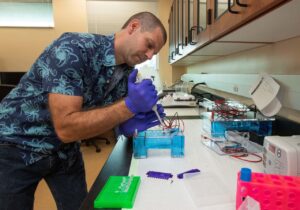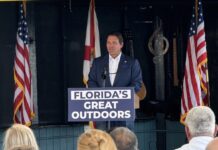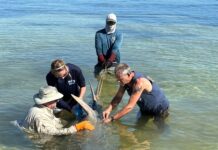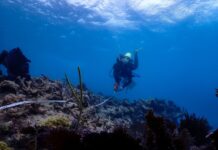Floridians will have one extra day of “bug-hunting” in July with an expansion of the annual lobster mini-season – and it’s leaving several Keys locals and officials scratching their heads at the reasons for, and impacts of, the change.
Gov. Ron DeSantis announced at a June 19 press conference at Dockside Boot Key Harbor in Marathon that Sunday, July 14 will mark a one-day Floridians-only addition to the traditional lobster sport season, set for July 24 and 25 this year. The regular spiny lobster season begins Aug. 6 and runs through March 31 each year.
“I hope everybody is able to do that, and I hope they have fun with it,” DeSantis told a crowd of Keys leaders and dignitaries.
“This is an excellent opportunity for residents here in Florida and for locals here in the Florida Keys to enjoy their time with our resources, making those memories that will last lifetimes and generations,” said FWC executive director Roger Young.
A locals-only day to target the prized crustaceans follows a series of moves by the governor to give Florida residents greater access to the state’s resources at a reduced cost. Earlier this month, DeSantis announced that a toll relief program providing a 50% credit to frequent highway drivers has so far saved $42 million for more than 1.2 million SunPass users. In 2023, House Bill 109 allowed state residents to make reservations at Florida’s state parks an extra month in advance.
The one-day expansion of lobster mini-season will reportedly be made possible by an executive order from DeSantis. But the vast majority of Keys officials and business leaders told the Keys Weekly that they had learned of the extra day at the same time as, or just barely before, the public.
“None of us knew that was coming,” said FWC Capt. David Dipre.
Ordinarily, FWC law enforcement brings 20 additional officers to the Keys for increased patrols during mini-season week and the start of the regular season, with 10 extra officers coming down in the week prior to mini-season to head off poaching attempts.
That’s still the plan, Dipre said, but the first group will now head to the Keys before the expanded weekend.
“We are 100% behind our governor, and we’re going to make it work,” he added. “We don’t know what to expect, whether there will be thousands of people or just a couple thousand people. Mostly, we expect there will be more day trippers than people coming for an extended stay.”
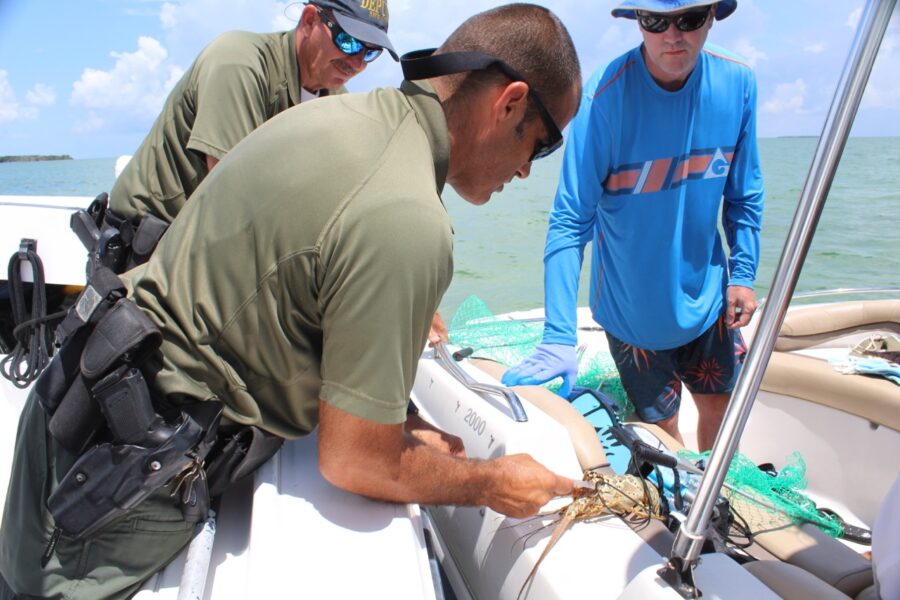
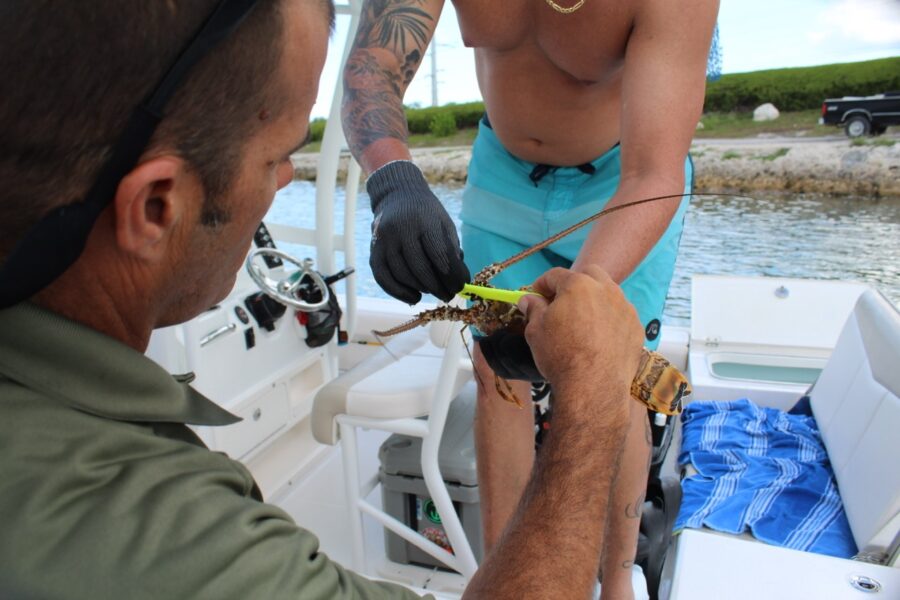
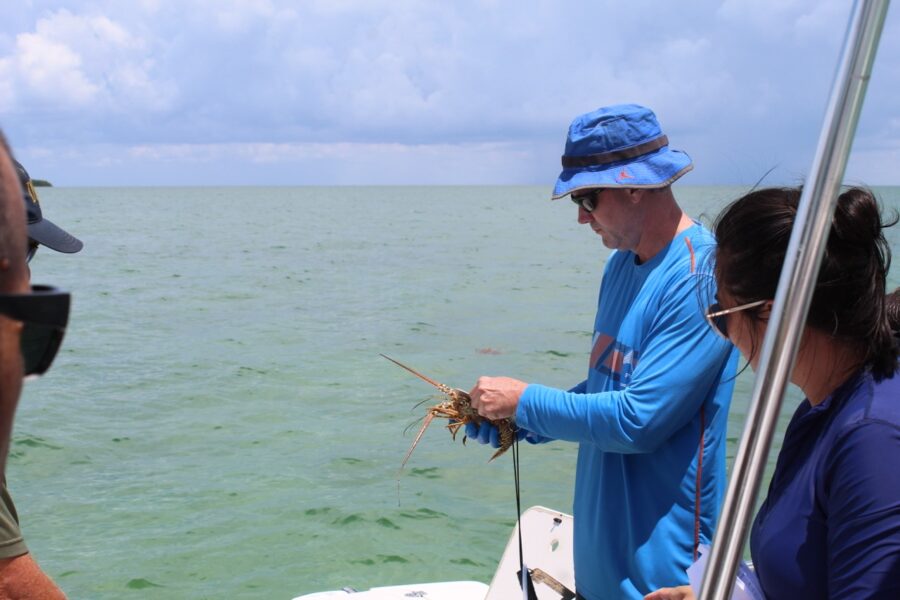
A shot in the arm for tourism?
With the driving forces behind the extra day still unclear, popular theories among Keys residents suggested the increased tourist traffic could provide a boost to area businesses, hotels and vacation rentals during a “down week” of the summer, or that the Floridians-only designation would allow residents a prized “first shot” at lobster “honey holes” in the Gulf or Atlantic. But according to some vacation rental professionals, that’s not the case.
Of the 85 Middle and Lower Keys rental units managed by the team at American Coastal Vacation Rentals, agent Leslie Christensen said “maybe 10 to 15” were still available for the week of the new harvest day, consistent with other summer weeks. And of the crews booking for the traditional mini-season, “probably 95%” are already in-state rentals.
“I was really curious to see if this week was going to fill up really quickly, and it hasn’t,” she said. “I think with the timing this year, it doesn’t seem that it’s really going to make any difference for us. We’ve had maybe three bookings since it was announced.”
Keys Ocean Vacation Rentals’ Mallory Pinto said that of the 16 rentals she manages during mini-season week, five are booked with Florida renters, with another four filled with out-of-state groups. Seven rentals block off the week from renters entirely due to a higher likelihood of overcrowding and damage to the home, she said.
Consequences for the catch
In an island chain where increasing numbers of locals have soured on mini-season in recent years with ever-growing traffic and environmental concerns, those who directly depend on the lobster fishery for their livelihoods share the concern.
“We know from the existing two-day mini-season that some of the greatest environmental damage in the Keys takes place during that period, and this is only going to increase it even more,” said Bill Kelly, the recently-retired executive director of the Florida Keys Commercial Fishermen’s Association. “It could have a substantial impact on our commercial catches, but I think our biggest concern is the environmental impact.”
“I understand what the governor is trying to do, but we’re subject to pretty strict fisheries management plans, and all of the limitations we have are based on years of catches and research,” added commercial fisherman Jerome Young, who took over the FKCFA’s executive director reins from Kelly in January.
Young said that to his knowledge, the decision for the extra day was made after minimal consultation with fisheries management professionals. He emphasized that his opinions weren’t a case of a clash between commercial and recreational lobstering, but a comment on a need for measured changes to the fishery.
“If we wanted to throw our traps in the water a week earlier, we’d have to go through the entire regulatory process,” he said. “I can assure you that biologists and fisheries management planners would be up in arms. … The reason we don’t throw our traps earlier in the month, and the reason we were pushed back into August, was because of egg-bearing females. Once you catch them, who knows what happens?”
Keys Weekly reached out to FWC Commissioner Rodney Barreto for a comment about the change on June 24, but as of presstime, had not received a response. Similarly, a public record request sent to FWC on June 24 sought documentation of the additional mini-season day. The agency confirmed receipt of the request, but replied in an automated email, “Due to an increased number of public records requests … you may experience a delay of a few weeks or more.”
Is the season ‘one and done?’
As of press time, it is still unclear whether the 2024 mini-season expansion will continue in future years and if the date will remain fixed, as the full text of DeSantis’ executive order is not yet available. The Keys Weekly has submitted a request to the governor’s press office for clarification on these items.
“It will be really interesting to see how it shakes out next year,” said Christensen. “Will the die-hard mini-season people come for their regular dates, or is it going to be more of a priority to have ‘first pick’ on the opening mini-season day?”
Know the rules
Early indications are that rules for July 14 will mirror already-established mini-season regulations, including municipality-specific requirements. And while the Florida-residents-only restriction at first begged questions of enforcement, Dipre said routine stops on the water will look largely the same.
“Any time you check anybody on the water, you must present a valid form of photo ID, so it’s what we do anyway any time we check a fishing license,” he said. “If you’re not a Florida resident, that doesn’t mean you can’t go on the boat. But if you have four people on the boat, and only one is a resident, then you should only have six lobster on that boat. (The others) can go in the water and still recreate … but they should not be harvesting lobster at all.”
Kill lionfish, get lobster
In the 30-minute press conference focusing primarily on funding for coral and artificial reefs along with water quality issues, DeSantis also announced that recreational lobster hunters can up their bag limits during the sport season by two lobsters per person per day through successful completion of FWC’s annual Lionfish Challenge — up from the one-per-day boost in prior years of the program.
Targeted at removing the invasive species from Florida waters, the annual program challenges divers to harvest a minimum of 25 destructive lionfish. Upon submitting removed tails from the lionfish as proof of harvest, challenge participants are presented with a challenge coin that permits the additional lobster harvest.





